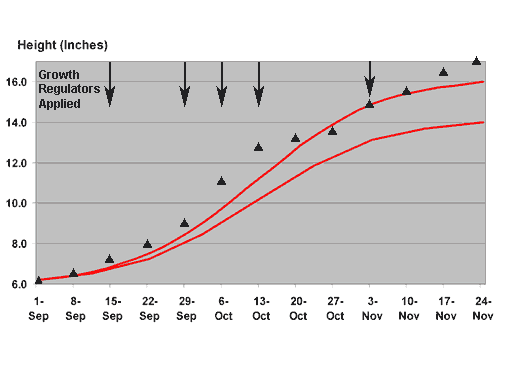2009 Ice Punch
Growth Regulators Applied / Height graph
Graph shows projected plant heights during production of the crop. Dots are plotted actual height each week. Arrows indicate when PGRs are applied with details in the weekly notes. We use the “late” graphical tracking curve and heights are from bench to height of growing tip. Heights are plotted from date of pinching to projected date of finish.

Notes
 11/24
11/24
This crop of Ice Punch has finished taller than we wanted, but the plants are fine. This crop does illustrate a problem with Ice Punch in warm conditions. They can continue growing right to the end and can get out of control late. Since the weather was warm and the plants were off to a good start we should have been more aggressive in late September to keep the plants more compact. An alternative, also, would have to applied an additional Bonzi drench on 11/10 to help control the late growth.
 11/17
11/17
This crop of Ice Punch is illustrating what the variety can do under warm conditions. These plants are considerably shorter than nontreated plants in our PGR trials. The plants are showing pollen now, but need another week to develop the good color contrast.
 11/10
11/10
This crop seems to be responding well to the Bonzi drench applied last week. The plants look good and are on schedule for finish in about 2 weeks.
 11/03
11/03
This crop of Ice Punch has grown out of the drench applied 3 weeks ago. With the milder temperatures hopefully we will be able to control elongation without using too much more PGR. Because of the reputation of this variety to be difficult to control at the end, we are putting on a late Bonzi drench at 1.0 ppm.
 10/27
10/27
This crop of Ice Punch looks good at this point. They should grow a little more during the next couple of weeks. These plants are showing first color, but may be a little behind the schedule.
 10/20
10/20
These plants have slowed down and look good now. A few plants are starting to show some color and the crop looks like it will finish on schedule.
 10/13
10/13
After two good PGR applications the past 2 weeks, these Ice Punch only slowed down a little. On an adjacent bench in a PGR trial, the untreated Ice Punch are 2 inches taller than these plants. So, the PGR applications are working even if it does not look like it. We are going to be aggressive here and make another Bonzi drench at 0.2 ppm. We feel it is better to hit them hard now rather than later when the bracts are expanding.
 10/06
10/06
Well established Ice Punch can be really vigorous and we are seeing that here. In research trials, we have seen Ice Punch be difficult to control in the last few weeks, so we still need to pull the reins in here. We are doing an early Bonzi drench at 0.2 ppm and will see how the plants respond.
 9/29
9/29
We had to make a decision on this crop. Taking the approach that we want good control early on Ice Punch, we are being a little aggressive and applying the medium rate spray, which is B-Nine at 1,500 and Cycocel at 1,250 ppm. For most varieties that are only slightly above the curve at this point, we would have used the low rate spray or even not treated.
 9/22
9/22
We did a low rate spray on these Ice Punch last week. We are not doing another spray this week, but anticipate making a PGR application next week.
 9/15
9/15
These Ice Punch look good and are growing well. Since they are off to a good start, we will start applying PGRs so they stay under control. They are being sprayed with the low rate of B-Nine and Cycocel (1,000 ppm each).
 9/08
9/08
Ice Punch is doing fine at this point.
 9/01
9/01
Ice Punch is very popular with consumers. Bract size is smaller than average so we want to avoid heavy PGRs near the end of the crop. However, it can become too tall and difficult to control. So we want to have good control in the middle of the crop. Also, it can be slow to take off and we do not want to hit it too hard early. From a scheduling and PGR stand point this is not an easy variety in warm climates.
